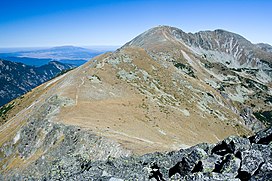Our website is made possible by displaying online advertisements to our visitors.
Please consider supporting us by disabling your ad blocker.
Musala
| Musala | |
|---|---|
| Мусала | |
 Musala seen from the south | |
| Highest point | |
| Elevation | 2,925.4 m (9,598 ft) |
| Prominence | 2,473 m (8,114 ft) |
| Isolation | 810 km (500 mi) |
| Listing | Country high point Ultra |
| Coordinates | 42°10′47″N 23°35′12″E / 42.17972°N 23.58667°E |
| Geography | |
| Location | Sofia Region, Bulgaria |
| Parent range | Rila |
| Climbing | |
| Easiest route | Gondola lift from Borovets, then hike |
Musala (Bulgarian: Мусала [mosɐˈɫa]); from Arabic through Ottoman Turkish: from Musalla, "near God" or "place for prayer" [1][2] is the highest peak in the Rila Mountains, as well as in Bulgaria and the entire Balkan Peninsula, standing at 2,925.42 metres (9,597.8 ft).[3]
With a topographic prominence of 2,473 metres (8,114 ft), Musala is also the 6th highest peak by topographic prominence in mainland Europe.[4] It is also the 3rd most topographically isolated major peak in Continental Europe.[5]
Musala is situated within the Rila National Park, which is noted for its rich flora, including species such as Macedonian Pine and Bulgarian Fir in the forests on its middle slopes, and fauna; it is one of the easiest places in Europe to see the wallcreeper. All major mountain ranges of Bulgaria can be seen from the top; these include Vitosha to the northwest, Sredna Gora towards the northeast, the Balkan Mountains along most of the northern horizon behind Vitosha and Sredna Gora, the Rhodope Mountains to the southeast, Pirin to the south, Osogovo and Ruy Mountain to the west, and of course, the rest of Rila.
A cosmic ray station was built on the peak in 1960 with cooperation from the Hungarian Academy of Science. The station conducted scientific experiments using a muon telescope. The station was destroyed by an electrical fire on October 29, 1983.[6]
With an average annual temperature of -2.2 °C, Musala is the coldest place in Bulgaria and the entire Balkan Peninsula.[citation needed] Temperatures stay below 0 °C for about 8 months each year.[7] Due to this, about 45% of the annual precipitation on Musala is snow, and snow cover lasts for about 200 days (more than six months).[citation needed] Three of the main rivers of Bulgaria, the Iskar, Maritsa and Mesta have their sources near Musala.
The next highest peaks in the vicinity of Musala are Malka (Little) Musala (2,902 metres (9,521 ft)) and Irechek (2,852 metres (9,357 ft)).
- ^ Известия на българското географско дружество, 1964 г. стр. 197.
- ^ Bŭlgarski ezik, Volume 19,Institut za bŭlgarski ezik (Bŭlgarska akademii͡a na naukite), 1969, str. 573.
- ^ "ГEOграфия'21, брой 5, 2007 г." www.prokarstterra.bas.bg. Retrieved 2023-06-09.
- ^ "Europe Ultra-Prominences". Peaklist. Retrieved 26 February 2015.
- ^ "Most Isolated Peak of Europe Countries - Peakbagger.com".
- ^ Kavlakov, S. (2009-11-16). "Cosmic Ray investigations on peak Musala in Bulgaria: A memoir". Advances in Space Research. Cosmic Rays From Past to Present. 44 (10): 1178–1182. Bibcode:2009AdSpR..44.1178K. doi:10.1016/j.asr.2008.10.040.
- ^ Cite error: The named reference
NOAAwas invoked but never defined (see the help page).
Previous Page Next Page



